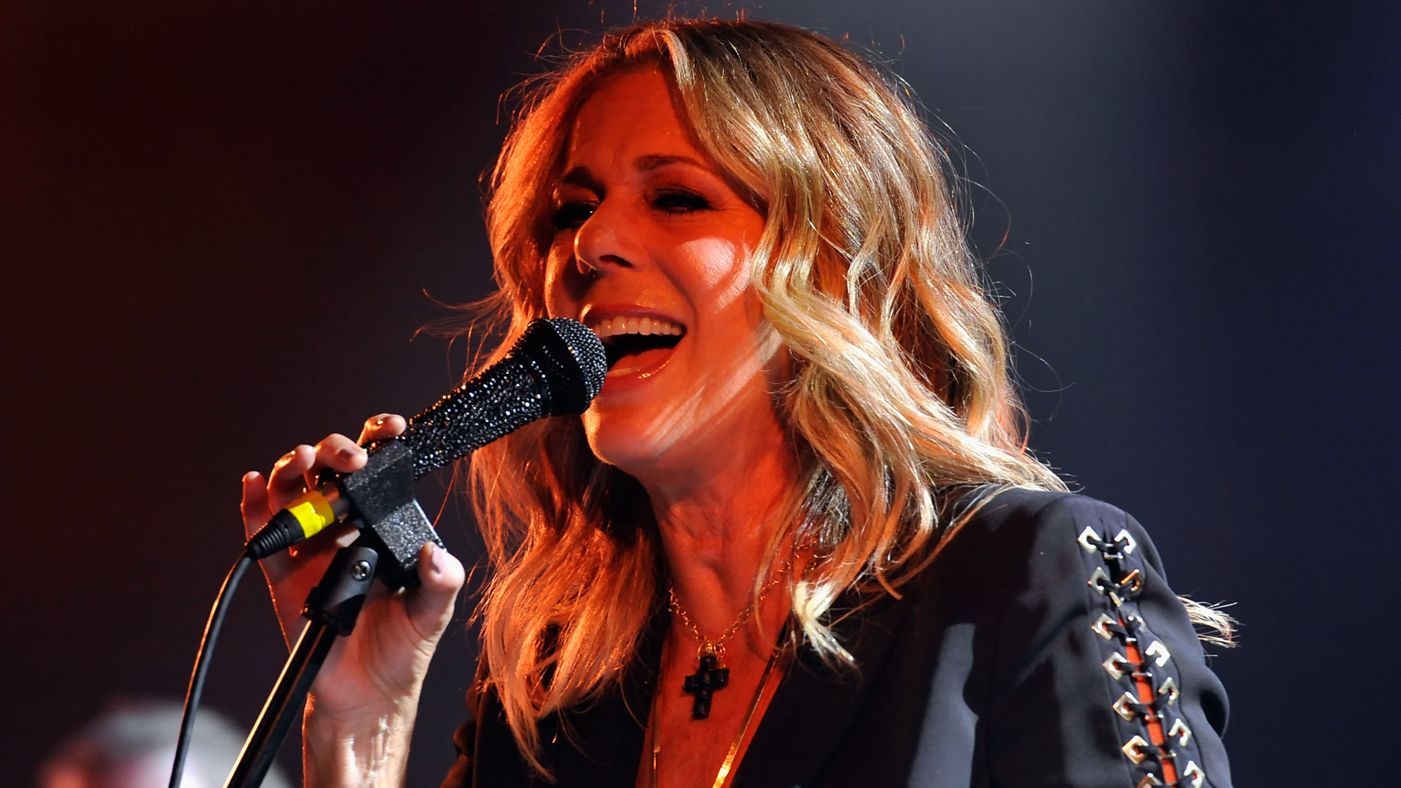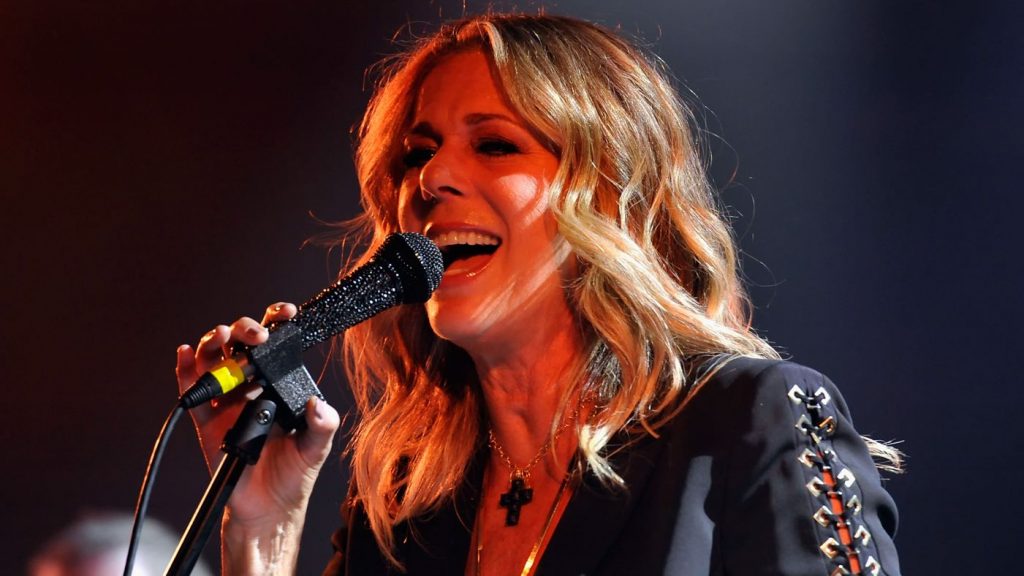“It was a dream I never dreamed because I never thought it could come true.” Rita Wilson is reflecting on the fact that she was given a star on the Hollywood Walk of Fame last year. Having grown up in Hollywood, Rita says she often walked past all of those stars—in fact, her mom used to get her hair done at the beauty school nearby. But the 63-year-old never once thought she’d have one herself. Of course, after dozens of roles in television, film, and theatre over the course of nearly four decades, that’s exactly what happened.
After all these accomplishments, Rita could have easily kicked back and relaxed. Instead, in 2012, she decided to pursue another passion—music. Over the past eight years, she has released four studio albums, and she’s hard at work on another. Recently, she released “Where’s My Country Song?” which she says is an ode to women everywhere. Through songwriting, she’s found another way to express herself, one that she says allows her to be vulnerable and really show who she is.

Rita’s personal life appears to be just as fulfilling. She’s been married to Tom Hanks for more than three decades, and together they have raised a happy family. And while Rita has had many wonderful highs in her life, she’s also faced quite a few difficult moments—particularly when it comes to health. Her mother passed away from Alzheimer’s in 2014, and not long after that, in 2015, Rita was diagnosed with breast cancer and underwent a double mastectomy. Thankfully, she has been cancer-free for nearly five years.
And this past March, while she and Tom were in Australia, they both tested positive for COVID-19. That led to a short hospital stay, where she was prescribed the drug chloroquine; Rita doesn’t know if the controversial treatment helped with her symptoms or not, she says, but does report extreme side effects, including nausea, vertigo, and weakness. They were among the first people in the public eye to share a positive diagnosis, and it really hit home for many who love them. Throughout their quarantine at a private home in Australia, Rita shared updates on social media—including posting a video of herself rapping Naughty by Nature’s “Hip Hop Hooray.” She later teamed up with the group to release a remix of the song, proceeds from which are being donated to the MusiCares COVID-19 Relief Fund.
We caught up with Rita over the phone (social distancing prevented an in-person chat) shortly after she returned to Los Angeles and were taken with how positive and grounded she is. Here, she opens up about discovering a second act with her music and how she got through tough times with her health.
You spent your entire career acting, before deciding to make music. What was it that made you want to do that?
I love the process of songwriting and making music. In acting, you go in, you do your role, you get excited about that character, and then everything is out of your hands. Bye-bye! You do your job, and then it’s in the editor’s hands, and hopefully, you like what you see. With songwriting, it’s a process that allows you to be creative and tell a story in three to four minutes that hopefully means something. I have so much that I want to say. In acting, if you’re an actress and you’re over the age of 30, it’s hard to find really great work that gets you super excited. With songwriting, every day I wake up and I’m excited to write.
How did you get started with songwriting?
When I met Kara DioGuardi, the songwriter, I told her that I’d give anything to write as she does. She said, “Well, why don’t you?” I told her, “I can’t write songs, and I don’t read music or play an instrument.” And she said, “Yeah, but do you have something you want to say?” It was so groundbreaking for me to hear that. She basically showed me how to write songs—she and another writer, Jason Reeves. It opened up the floodgates, and I have not stopped writing since.
What was that first experience like?
Well, I’ll tell you what it initially felt like to me, because I had never done it before. With songwriting, it is like a setup: You go into a room, you meet a complete stranger, you fall instantly in love. You strip naked emotionally. You make beautiful musical intercourse, and you leave with a beautiful song baby. That’s what it felt like to me. It was that feeling of, like, “Oh, hi, stranger. I’m going to spill my guts for you right now, and you’re going to spill your guts to me, and we’re going to make a song together.” It was that crazy. It felt that scary and dangerous, and sort of vulnerable in a way. Now, I still feel that, but it’s not so terrifying.
Did writing help you figure out the type of musician you wanted to be?
That is the best question—no one has ever asked me that. That is exactly what happened. I started realizing that it was the first time I felt like a true artist because I could say what I wanted to say in the way I wanted to say it. With acting, the material that I was getting was the same kind of characters—the warm, kind, understanding sister, daughter, mother, wife. I’ve exhausted the canon of those roles. I’m done playing them unless they’re going to be crazy or very dark versions of those. With music, I remember having an absolute epiphany one day that, “Oh, wow, this is what it feels like to be an artist.” It doesn’t matter if you get a number one hit because the experience is a gift.
So it’s a deeply personal process?
Yes. If it’s your own personal experience, you’re suddenly in a place that feels very exposed. That’s one of the things I like about it. I always feel like if something scares you creatively, you should probably be doing it instead of running away from it.
Are you producing anything right now?
I have a really wonderful project that is based on the creator of Barbie. Her name is Ruth Handler, and it’s an amazing story. We always know the names of the men behind companies. Yet women that did these things? We don’t really know about them. Her story was so interesting, and it took us about two years to get the family to give us the rights to her autobiography. We finally got them, and the script is now being written.
Switching gears, June is Alzheimer’s & Brain Awareness Month. Your mother passed away from the disease. What advice would you give to people taking care of parents or loved ones with Alzheimer’s?
It is one of the hardest things families go through. Even in the closest of families, it creates a lot of tension and anxiety. This person that you love, that raised you, doesn’t recognize you anymore, and you are losing them every day, little by little. One day, when my mom was no longer speaking, our priest came by to visit. It just happened to be a day when everyone was there. We were all around my mom’s bed, and I said, “I don’t get this, Father. Why doesn’t God just take her? She’s not even living; she’s just there.” He took a beat and said, “She’s still teaching you.” I really thought about it, and it was so true. I learned so much from my mom—even through her Alzheimer’s. You learn about yourself, about your family, about grieving and letting go. You learn about what’s important and what’s not. That disease is not something you’d ever wish on anybody, but I try to find the beauty in it, too.
Once you realize that there’s something in you that is trying to kill you, you have to accept that there’s going to be a new normal. Look, I’m five years clean now, and it evolves. When it first happens, you’re like, “What is this?” It’s different. I’m so thankful that there is reconstruction.
How did it shift your relationship with your body?
It’s been a few years of feeling back to normal. I think the relationship to my body is that I don’t take it for granted. Of course, my diet and alcohol consumption have changed because of what we know helps. For example, a plant-based diet is much healthier for breast cancer—and [I have] only three to five glasses of alcohol per week. That is not a lot when you really get down to it, and so there’s a discipline that comes to that. I’m healthy today. I am not going to take it for granted, and I’m not going to mess with it.
In March, you and Tom were in Australia for one of his film projects when you were both diagnosed with COVID-19. That must have been scary.
You always think that bad things happen to other people—until it happens to you, and you realize you’re not immune to it. It was similar with my breast cancer diagnosis. While all this was going on, I actually said to Tom, “Before breast cancer, it was a thing that was sort of in the distance or something that happens to other people.” And then I said, “But I don’t feel that way anymore. I mean, who’s to say we won’t get [COVID-19]?” And then we got it. It was so strange. But we had really great medical care, and thankfully we are doing well.

